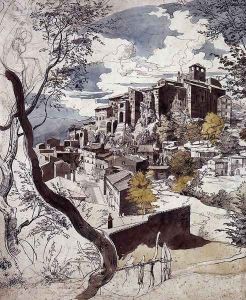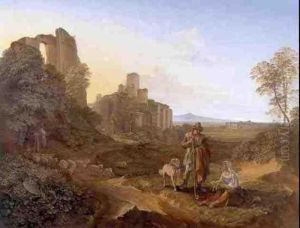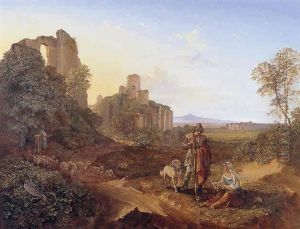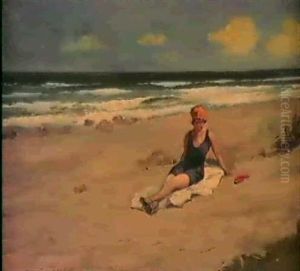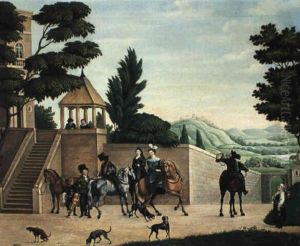Franz Horny Paintings
Franz Horny was a notable German painter and engraver born on January 22, 1798, in Weimar, Germany. He was part of the early Romantic movement, an era that emphasized intense emotion as an authentic source of aesthetic experience, countering the rational ideals of the Enlightenment period. Horny's life was relatively short, as he died at the young age of 26 on September 28, 1824, in Olevano Romano, Italy, but his impact on the art world, particularly in landscape and architectural painting, was significant.
Franz Horny embarked on his artistic journey under the guidance of his father, who was a court painter. He later attended the Weimar Princely Free Drawing School, where he was influenced by the teachings of Johann Wolfgang von Goethe, a towering figure in German literature who also had a profound interest in the visual arts. Goethe's encouragement and patronage were instrumental in Horny's development as an artist. In 1819, Horny traveled to Italy, a journey that was crucial for many artists of the Romantic period, seeking inspiration from its landscapes, ancient ruins, and the luminous quality of its light. Italy's profound effect on Horny was evident in much of his work, which often depicted Italian scenery with a delicate sensitivity to atmosphere and light.
Horny's oeuvre includes a variety of subjects, from detailed architectural renderings to expansive landscapes. His works are characterized by their romantic sensibility, attention to detail, and the subtle interplay of light and shadow, capturing the ephemeral beauty of the natural and built environments. Despite his brief career, Horny produced a significant body of work that was well received by his contemporaries. He was particularly adept at using watercolors, a medium that allowed him to experiment with light effects and atmospheric conditions in his landscapes.
After his death, Franz Horny's contributions to art were recognized by his peers and subsequent generations. His works have been collected and exhibited by various museums and galleries, showcasing his talent in capturing the essence of the Romantic spirit. His legacy is that of a young artist whose life was cut short, but whose passion for the natural world and the ruins of antiquity left a lasting imprint on the Romantic movement in art. Horny's ability to convey the sublime beauty of landscapes and architectural forms with emotional depth and technical precision remains his enduring contribution to the world of art.
